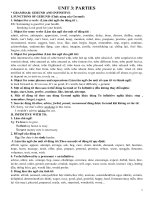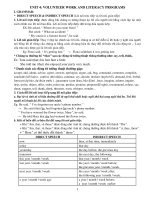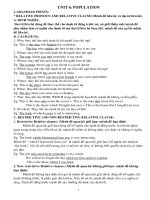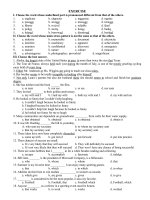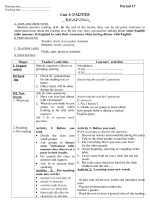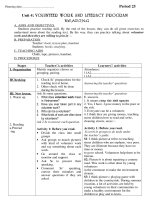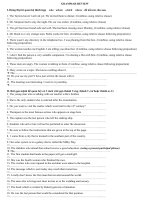Bài Tập TA 11 NC - unit 6
Bạn đang xem bản rút gọn của tài liệu. Xem và tải ngay bản đầy đủ của tài liệu tại đây (71.12 KB, 9 trang )
UNIT 6: POPULATION
I. GRAMMAR POINTS:
* RELATIVE PRONOUN AND RELATIVE CLAUSE:(Mệnh đề liên hệ và đại từ liên hệ).
A. ĐỊNH NGHĨA:
Đại từ liên hệ dùng để thay thế cho danh từ đứng trước nó, nó giới thiệu một mệnh đề phụ
nhằm làm rõ nghóa cho danh từ mà đại từ liên hệ thay thế, mệnh đề này gọi là mệnh đề liên
hệ.
B. CÁCH DÙNG:
1. Who: thay thế cho một danh từ chỉ người làm chủ ngữ.
Eg: This is the man who helped me yesterday.
The boy who studies the best in this class is my son.
2. Whom: thay thế cho một danh từ chỉ người làm tân ngữ.
Eg: The man whom you met yesterday is my uncle.
3. Whose: thay thế cho một danh từ chỉ người làm sỡ hữu.
Eg: The woman whose son is my friend is a good doctor.
4. Which: thay thế cho một danh từ chỉ vật làm chủ ngữ hoặc tân ngữ.
Eg: The house which has green door is mine.
The car which you have just bought is new and comfortable.
5. Where: thay thế cho một danh từ chỉ nơi chốn.
Eg: This is the place where I was born and grew up.
6. When: thay thế cho một danh từ chỉ thời gian.
Eg: The day when you came was on Sunday.
7. That: thay thế cho WHO, WHICH trong mệnh đề hạn đònh: mệnh đề không có dấu phẫy.
Eg: This is the man who wrote this novel = This is the man that wrote this novel.
This is the house which I bought last year = This is the house that I bought last year.
8. Of which: Thay thế cho danh từ chỉ vật làm sỡ hữu.
Eg: The book of which cover is red is interesting.
C. RESTRICTIVE AND NON-RESTRICTIVE RELATIVE CLAUSE:
1. Restrictive Relative clauses: (Mệnh đề quan hệ giới hạn- mệnh đề hạn đònh)
Mệnh đề quan hệ giới hạn dùng để bổ nghóa cho danh từ đứng trước, là một bộ phận
quan trọng trong câu. Nếu bỏ nó đi, mệnh đề chính sẽ không được xác đònh và không có nghóa
rõ ràng.
Eg: The book which I borrowed from you is very interesting.
Mệnh đề “ which I borrowed from you” là mệnh đề quan hệ giới hạn, bổ nghóa cho danh từ
“the book”. Nó rất cần thiết trong câu vì nếu bỏ nó đi ta sẽ không biết quyển sách nào sẽ được
nói đến.
Eg: The girl who came here yesterday is my cousin.
We will never forget the day when we first came to London.
This is the place where I was born.
2. Non- restrictive Relative clauses: (Mệnh đề quan hệ không giới hạn- mệnh đề không hạn
đònh):
Mệnh đề không hạn đònh còn gọi là mệnh đề quan hệ giải thích, dùng để bổ nghóa cho
danh từ đứng trước, là phần giải thích thêm. Nếu bỏ nó đi, mệnh đề chính vẫn có ý nghóa rõ
ràng. Danh đề đứng trước mệnh đề này thường đã được xác đònh rồi.
1
Eg: My father, who is fifty-five years old, is an engineer.
Miss White, whom we studied English with, is a very nice teacher.
I want to help Peter, whose parents died in the accident.
He often comes to visit Nha Trang, where he grew up.
* Note: Một số điểm cần lưu ý khi dùng mệnh đề không hạn đònh:
1. Mệnh đề không hạn đònh thường được tách khỏi mệnh đề chíng bằng dấu phẩy hoặc dấu
gạch ngang.
2. Đại từ quan hệ THAT không được dùng trong loại mệnh đề này.
3. Không lượt bỏ đại từ quan hệ (Who/ Whom/ which) trong mệnh đề này.
D. CÁCH NỐI HAI CÂU ĐƠN THÀNH MỘT CÂU PHỨC BẰNG CÁCH DÙNG CÁC ĐẠI
TỪ LIÊN HỆ:
1. Xác đònh hai từ trùng lập nhau trong hai câu đơn.
2. Bỏ đi từ giống nhau trong câu thứ hai thay thế bằng một đại từ liên hệ thích hợp đặt ở
đầu câu thứ hai.
3. Đem cả câu thứ hai lên đặt ngay sau từ giống nhau trong câu thứ nhất.
EX: The man is my father. You met him yesterday.
b1 b1
The man is my father. Whom you met yesterday.
b2
The man whom you met yesterday is my father.
B3 (thành phẩm)
II. EXERCISES:
A. PHONETIC:
* Choose the word whose bold/ underlined part is pronounced differently frm that of the other three.
1. A. cause B. haul C. fault D. because
2. A. population B. average C. favorite D. station
3. A. people B. creosote C. theory D. geometric
4. A. growth B. math C. brother D. strength
5. A. education B. special C. economy D. uncommon
* Choose the word which has a different stress pattern from that of the other three.
1. A. unwillingness B. population C. unemployment D. contraception
2. A. unhealthy B. poverty C. family D. energy
3. A. expression B. following C. enormous D. condition
4. A. water B. female C. shortage D. control
5. A. responsible B. illiterate C. estimation D. constructively
B. VOCABULARY:
* Find out the antonym of the following words or phrases:
Word / Phrase Antonym
1. increased
2. failure
3. discouraged
4. slow
5. very small or limited
6. a family with a lot of children
7. the upper parts
8. emigrants
2
* Complete each sentence below by using a suitable antonym above:
1. There have been more and more ___________ in our modern society.
2. Entering the WTO, Viet Nam has got ___________ opportunities to develop its economic potentials.
3. Most young couples in that remote village are ___________ to delay having their first child as a birth -
control method.
4. Unlike the situations in the upper and middle ones , ___________ of this river have a much larger
population.
5. The total number of newborn babies in my neighborhood has ____________ sharply during the last
three years.
6. Our city receives approximately half a million __________ to strengthen its labor force each year.
7. To many people living in the countryside, having at least a son is often considered their greatest
___________ in life.
8. Most immigrants from various rural areas find it extremely difficult to adapt themselves to the
______________ changes in this big city.
C. GRAMMAR AND STRUCTURE:
* EXERCISE 1: Choose the most correct written out form of each fraction below:
1. 1 / 2 A. one half B. one second C. oneth two D. one two
2. 9 / 10 A. ninth ten B. nine tenths C. nine tenth D. nine tens
3. 67 / 100 A. sixty seven percent B. sixty seventh percent
C. sixty seventh percents D. sixty seven percents
4. 5 / 4 A. five over four B. five quarters C. five forths D. five over fourth
5. 1 / 100 A. one percent B. one a hundredth C. a one hundredth D. All are correct
* EXERCISE 2: Choose the best answer: (ẹaùi tửứ lieõn heọ, Although, Though,Even though, Despite, In spite
of...)
1. ................... what I said last night, I still respect you.
A. Until B. Despite C. Although D. Even though
2. ................... the traffic was bad, I arrived on time.
A. Despite B. In spite of C. But D. Although
3. A lot of things went wrong ................... I had planned everything carefully.
A. but B. because C. although D. in spite of
4. I dont like stories ................... have unhappy endings.
A. that B. who C. in which D. whose
5. The man ................... came from Vinh was the guide for our group during my holiday.
A. whom B. which C. whose D. who
6. I recently went back to the town ................... I was born.
A. which B. where C. in where D. at where
7. I would like to live in a country ................... there is plenty of sunshine.
A. when B. which C. where D. of which
8. My classmate, ................... I wanted to see, was on holiday.
A. whom B. which C. that D. whose
9. Thats the old lady ................... husband won the Nobel Prize.
A. whose B. who C. whom D. that
10. My friend, ................... hates travelling, refused to go with me to Ha Long Bay.
A. who B. whose C. that D. whom
11. Edward, ................... father is my boss, has just moved to Paris.
A. who B. which C. where D. whose
12. We climbed to the top of the mountain, ................... we had a picnic.
A. that B. where C. which D. on where
3
13. We don’t want to swim in the sea, ................... looks very dirty.
A. where B. which C. when D. who
14. He gave me the important information, ................... I noted down at once.
A. which B. that C. what D. why
15. Did he explain ................... went wrong?
A. that B. what C. where D. when
16. He’s the painter ................... last exhibition was such a failure.
A. who B. which C. that D. whose
17. I’m looking forward to the programme ................... is on after the news.
A. it B. its C. which D. whose
18. I told the policeman ................... had happened.
A. that B. what C. where D. when
19. I never got the time ................... we spent the holiday together.
A. when B. that C. in which D. what
20. I don’t know the reason ................... he didn’t enjoy the party.
A. when B. where C. what D. why
21. Women used to hang the carpets outside and beat them with carpet beaters ................... clean them.
A. in order to B. so that C. although D. however
22. ................... he behaved so badly, he was punished.
A. Although B. Since C. So D. So that
23. ................... does John go to church on Sundays.
A. No longer B. No C. No any more D. Not any longer
24. ................... the rain, we went out.
A. Although B. Since C. For D. In spite of
25. ................... modern appliances mean that household chores can be done more quickly than before, it
still takes a lot of time to do house work.
A. Although B. In spite of C. Unless D. If
26. He walked slowly ................... his injured legs.
A. because B. because of C. since D. for
27. Your explanation ................... reasonable.
A. is not sound B. does not sound C. is not sounded D. is not sounding
28. It’s the best book ................. I’ve ever read.
A. which B. who C. that D. what
29. That is the businessman ................. company is so successful.
A. whose B. of which C. who’s D. of whom
30. Is that the town ................. you were born?
A. which B. that C. whose D. where
31. You can go ................. you like. This isn’t private land.
A. nowhere B. somewhere C. anywhere D. there
32. The librarian went to look in the cupboard ................. rare books were kept.
A. which B. that C. where D. when
33. I’ve put Mr Matthew’s papers in your green file, ................. is on your desk.
A. of which B. that C. which D. whom
34. Just try and imagine ................. life would be like without water.
A. how B. what C. that D. if
35. Two men, neither of ................. I had ever seen before, came into my office.
A. whom B. that C. whose D. which
36. My radio, ................. isn’t very old, had suddenly stopped working.
A. that B. which C. of which D. whose
4
37. They asked me a lot of questions, some of ................. I couldn’t answer.
A. which B. that C. whom D. who
38. He always did well at school ................. having his early education disrupted by illness.
A. on account of B. in addition to C. in spite of D. although
39. It was raining, but the baseball game wasn’t cancelled.
A. The baseball game wouldn’t be cancelled until it stopped raining.
B. Though it was raining, the baseball game wasn’t cancelled.
C. In spite of raining, the baseball still went ahead.
D. The organizer put off the baseball game untill after the rain.
40. We stayed in that hotel despite the noise.
A. The hotel was not noisy, so we stayed there.
B. We stayed in the noisy hotel and we liked it.
C. Although the hotel was noisy, we stayed there.
D. The noise kept us staying in the hotel.
41. Although she is rich, she can’t afford to buy the car.
A. She doesn’t have enough money to buy the car she likes.
B. Rich as she is, she can’t afford to buy the car.
C. The car is too expensive for her to buy.
D. She wants to buy the bike but it costs a lot.
42. Although he took a taxi, Bill still arrived late for the concert.
A. Bill arrived late for the concert whether he took a taxi or not.
B. Bill arrived late for the concert because of the taxi.
C. In spite of taking the taxi, Bill arrived late for the concert.
D. Bill took a taxi to the concert, but he couldn’t catch it.
43. This is the man ……………. saved the child .
A. who B. whom C. whose D. which
44. Mary is the girl ……………. they are talking .
A. about who B. about whom C. whose D. to which
45. Do you know the way ……………. leads us to the city ?
A. where B. what C. when D. which
46. The house ……………. roof is red belongs to my uncle .
A. whose B. which C. in which D. that
47. Do you remember the day …………….we first meet each other ?
A. where B. which C. whose D. when
48. This is the village …………….we were born .
A. which B. in which C. where D. B & C are
correct
49. Can you tell me the reason ……………. he left his school ?
A. that B. why C. which D. because
50. We hear the same story ……………. you have told me .
A. who B. where C. whose D. which
51. I’m looking for the man ……………. shirt is blue .
A. who B. whom C. whose D. that
52. There is the boy ……………. mother won the Nobel prize .
A. whose B. whom C. where D. that
53. It’s the English pronunciation ……………. causes me a lot of difficulties .
A. which B. that C. what D. A & B
54. It’s Mary ……………. received all the letters yesterday .
A. that B. who C. whom D. whose
5
